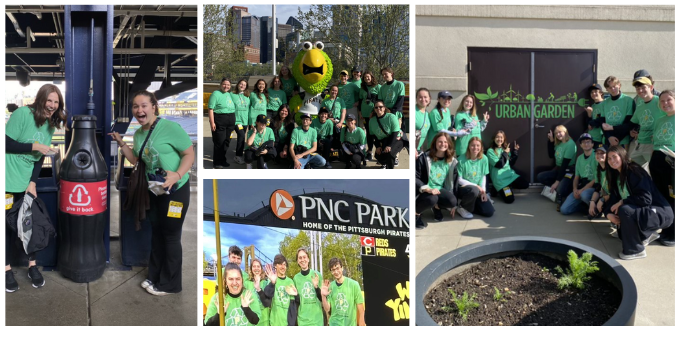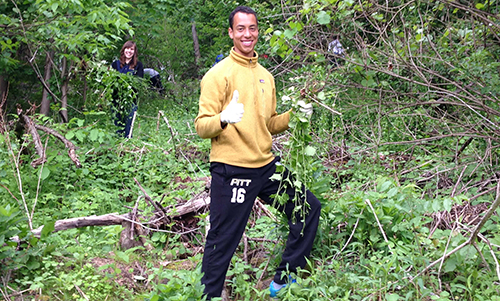The Mascaro Center's students, faculty, and staff participate in and lead a variety of sustainability-focused service initiatives throughout the Pittsburgh community.
Additionally, participants in MCSI's annual Undergraduate Summer Research Program regularly engage in service work over the course of their 12-week program. And student organizations often collaborate with MCSI to develop and carry out various service projects.
Recent Service Projects
- Oasis Farm & Fishery
-
 Since 2015, the Mascaro Center has extensively collaborated with Oasis Farm & Fishery (OFF), an initiative of Homewood’s Bible Center Church which grows local, sustainable produce and educates individuals about urban farming practices.
Since 2015, the Mascaro Center has extensively collaborated with Oasis Farm & Fishery (OFF), an initiative of Homewood’s Bible Center Church which grows local, sustainable produce and educates individuals about urban farming practices.In 2021, MCSI secured a Year of Engagement Grant from the University of Pittsburgh which funded the construction of a high-tunnel greenhouse for OFF, allowing them to extend their growing season.
 MCSI additionally funded the construction of an indoor, climate-controlled hydroponic greenhouse which is maintained by Pitt’s Hydroponics Club. These projects have allowed OFF to grow produce year-round for the Pitt Pantry, Homewood’s Everyday Café, and local community members.
MCSI additionally funded the construction of an indoor, climate-controlled hydroponic greenhouse which is maintained by Pitt’s Hydroponics Club. These projects have allowed OFF to grow produce year-round for the Pitt Pantry, Homewood’s Everyday Café, and local community members.
Multiple student groups have consistently volunteered to construct and maintain OFF’s growing facilities, including the Pitt Hydroponics Club, Pitt’s Engineers Without Borders chapter, and participants in MCSI’s Undergraduate Summer Research Program.
Over several years, these groups have built and maintained garden beds, aquaponics facilities, and greenhouses, harvested and planted crops, and constructed garden features such as woodchip paths and pergolas.
- Pittsburgh Pirates
-
In April 2023, MCSI collaborated with the Pittsburgh Pirates Earth Day game to engage fans about the many green initiatives at PNC Park. Students were green ambassadors throughout the game, and helped fans to properly dispose of their recyclable and compostable waste.

- Grounded
-
In June 2022, MCSI collaborated with a local nonprofit, Grounded, to engage students from MCSI’s Undergraduate Summer Research Program in a community service project in the Hill District. Students were tasked with improving the aesthetic character and usability of a vacant lot through the removal of trash and invasive plant species, creation of garden beds, and incorporation of over 200 native and edible plants into the revitalized space.

- Garfield Community Farm
-

In 2015 and 2016, MCSI partnered with Garfield Community Farm to assist with maintaining their farmland. Students participating in MCSI’s Undergraduate Summer Research Program were tasked with harvesting produce, preparing garden beds for future planting, and removing invasive plant species.
- Millvale Community Cleanup
-
Students participating in MCSI’s 2016 Undergraduate Summer Research Program spent a day volunteering in Millvale, where they assisted in community efforts to clean and maintain the Millvale Community Library and its rain gardens, as well as several street trees planted throughout the borough. Students aided in a variety of tasks, from picking up trash and debris to weeding planting beds.

Past Service Initiatives
Explore MCSI's past service initiatives with community members and local organizations using the tabs below.
- Battery Recycling
-
The previous battery recycling program on the University of Pittsburgh's campus was limited and not accessible to individual members of the campus community. The work of Dr. Amy Landis initiated a highly visible, easily accessible, campus-wide battery recycling program that additionally raised awareness among community members about the impacts of electronic waste disposal. This was accomplished through the installment of educational posters and battery collection locations throughout campus.
- Ceramic Filter Project
-
The Ceramic Filter Project is a multidisciplinary group at the University of Pittsburgh that works with community organizations in the Pittsburgh area on the development and implementation of low-cost ceramic water filters through service learning experiences and research.
 The activities of the Ceramic Filter Project are supervised and coordinated by Dr. Ian Nettleship in the University of Pittsburgh's Department of Mechanical Engineering and Materials Science. Dr. Nettleship works with student organizations (Engineers Without Borders, Engineers for a Sustainable World, etc.) and other faculty to recruit students into the project and develop documented "hands-on" service based learning experiences for student participants. Dr. Nettleship also works with other faculty on curriculum development and research programs related to the activities of the Ceramic Filter Project.
The activities of the Ceramic Filter Project are supervised and coordinated by Dr. Ian Nettleship in the University of Pittsburgh's Department of Mechanical Engineering and Materials Science. Dr. Nettleship works with student organizations (Engineers Without Borders, Engineers for a Sustainable World, etc.) and other faculty to recruit students into the project and develop documented "hands-on" service based learning experiences for student participants. Dr. Nettleship also works with other faculty on curriculum development and research programs related to the activities of the Ceramic Filter Project.Safe drinking water is essential to health, survival, growth, and development. Over 884 million people worldwide do not currently have access to clean drinking water. The World Health Organization says that millions of people die each year from diarrhea because they don't have access to clean water. Clay-based ceramic water filters are among a few technologies that are recognized to be promising and accessible technologies by the World Health Organization because they have been shown to be very effective at removing bacteria from drinking water. It is also a sustainable approach because all societies have a functioning ceramics manufacturing industry that has traditionally supplied containers for household water storage.
Ian Nettleship heads a team of engineers studying the distribution of silver through ceramic water filters. The metal tends to flake off the surface of the filter, so Nettleship's team seeks a longer lasting solution. The tiny, nondescript domes dripping water into Home Depot buckets don't look like much in the name of saving lives or cutting edge research, but Nettleship points out that the filters remove contaminants from drinking water, with the potential to save thousands of lives.
His team collaborates with Potters for Peace, and a group of ceramic artists who have been developing the filters in a pottery studio in Braddock, Pa., a former steel town adjacent to Pittsburgh. Nettleship and his students study the ways the metal needs to cooperate with the clay; Potters for Peace work on distributing the filters and disseminating information about their use.
- Frick Park Conservation
-
In 2015, participants in MCSI's annual Undergraduate Summer Research Program worked with the Pittsburgh Parks Conservancy to remove an invasive species, garlic mustard, from Frick Park in Squirrel Hill. View photos of the service event on Flickr.

- Kingsley Association
-
The Kingsley Association, located in Larimer, endeavors to create comprehensive educational, recreational, and social programming that positively impacts the lives of youth, their families, and the East End community as a whole. MCSI has collaborated extensively with Kingsley since 2007.
 Dr. Melissa Bilec, in collaboration with Penn State University (PSU), the Penn State Center, and the Kingsley Association, completed a unique, service-based learning course where University of Pittsburgh students conducted energy assessments in the Larimer community. The course, led by MCSI's Dr. Bilec and titled Design for the Environment, served as a pilot site for PSU's National Energy Leadership Corps (NELC) project. NELC’s mission is to train and mobilize students to conduct free home energy assessments, with the goal of reducing home energy use while promoting parallel learning among students and homeowners. The semester culminated in a community symposium at Kingsley, where the students presented their final reports and individually discussed low-cost opportunities to save energy with the homeowners.
Dr. Melissa Bilec, in collaboration with Penn State University (PSU), the Penn State Center, and the Kingsley Association, completed a unique, service-based learning course where University of Pittsburgh students conducted energy assessments in the Larimer community. The course, led by MCSI's Dr. Bilec and titled Design for the Environment, served as a pilot site for PSU's National Energy Leadership Corps (NELC) project. NELC’s mission is to train and mobilize students to conduct free home energy assessments, with the goal of reducing home energy use while promoting parallel learning among students and homeowners. The semester culminated in a community symposium at Kingsley, where the students presented their final reports and individually discussed low-cost opportunities to save energy with the homeowners. With the assistance of Rebuilding Together Pittsburgh, the work continued that summer to implement the identified energy saving initiatives into qualifying homes. Dr. Bilec's and Kingsley's environmental justice work was eventually expanded upon to include indoor and outdoor air quality monitoring, which was conducted in the Larimer community with the help of bike-mounted volunteers.
With the assistance of Rebuilding Together Pittsburgh, the work continued that summer to implement the identified energy saving initiatives into qualifying homes. Dr. Bilec's and Kingsley's environmental justice work was eventually expanded upon to include indoor and outdoor air quality monitoring, which was conducted in the Larimer community with the help of bike-mounted volunteers.In the summer of 2010, participants in MCSI's Undergraduate Summer Research Program helped to develop plans that would find new uses for vacant lands and generate opportunities for new jobs and a more viable economy.
In the spring of 2011, students from MCSI and Pitt's Engineers for a Sustainable World chapter partnered with the Kingsley Association to teach six classes on practical sustainability topics as part of Kingsley’s Junior Urban Leadership Institute afterschool program. The topics covered included an overview of sustainability and community problems, food, energy, buildings, design for environment, and water and waste management. Each class was about two hours long, with a fluctuating set of three to six students. The goals of this program were to focus on practical sustainability solutions and to help design sustainability projects for future implementation in Larimer, such as lighting for basketball courts, solar-heated water from refrigerator coils, and mushroom caves created from shipping containers.
- Vandergrift Improvement Project
-
The Mascaro Center previously worked with the citizens of Vandergrift, located in Westmoreland County, PA (population: 5,200) to help them become more sustainable while also thriving economically. A group of local citizens, the Vandergrift Improvement Project, decided to try to grow the town using principles of sustainability modeled after the Swedish Natural Step program. The Mascaro Center is working to help them to achieve these goals.
Beginning in 2005 under the direction of Dr. Mary Besterfield-Sacre, teams of students worked to determine how one might reduce the energy load of the historic Casino Theatre while maintaining its unique character. A second team, led by Dr. Lisa Weiland, examined how micro hydro technologies might enable the Vandergrift business district to lower its energy bills, helping to attract new businesses to town.
Results have shown that the Kiskiminetas River is a significant untapped natural energy resource for the town. There also was a knowledge gap, says Weiland, about how best to harness that resource. Weiland recognized that the situation presented a rare opportunity to close that gap by developing new sustainable-energy technology, which would likely have applications far beyond Vandergrift. So she organized a student team—known as the Hydrokinetic Energy Harvesting Team—to work on a new technology.
With Weiland’s guidance and seed funding from the Mascaro Center and the Heinz Endowments, the students are now working with Vandergrift residents to harness the Kiski River’s energy in innovative ways while also reducing the town’s energy consumption.
